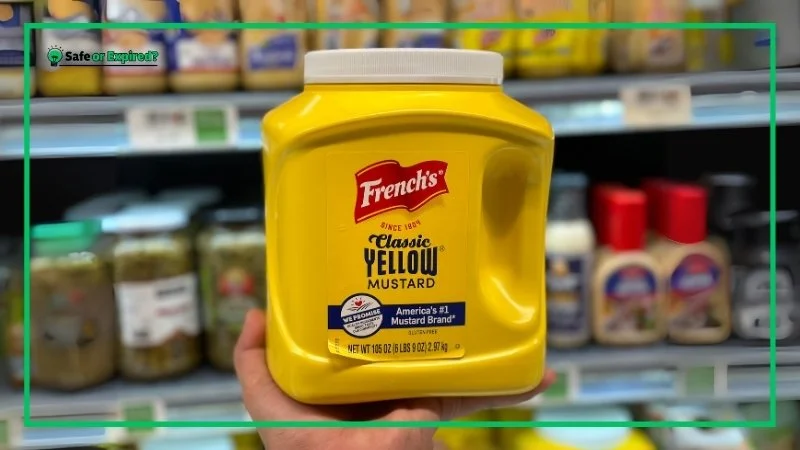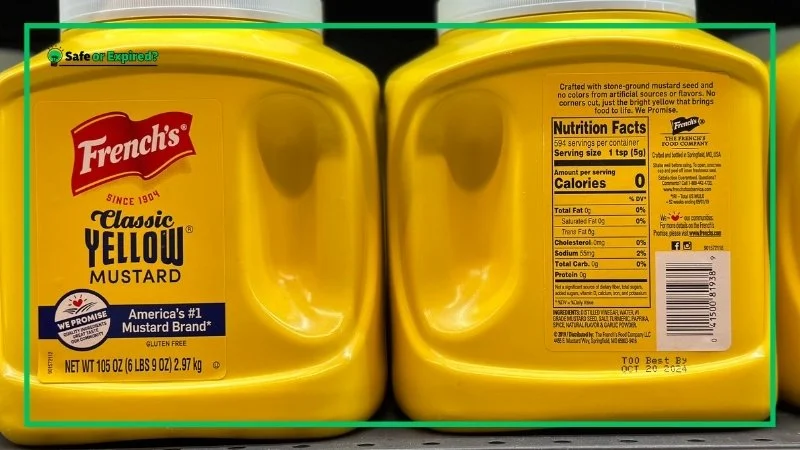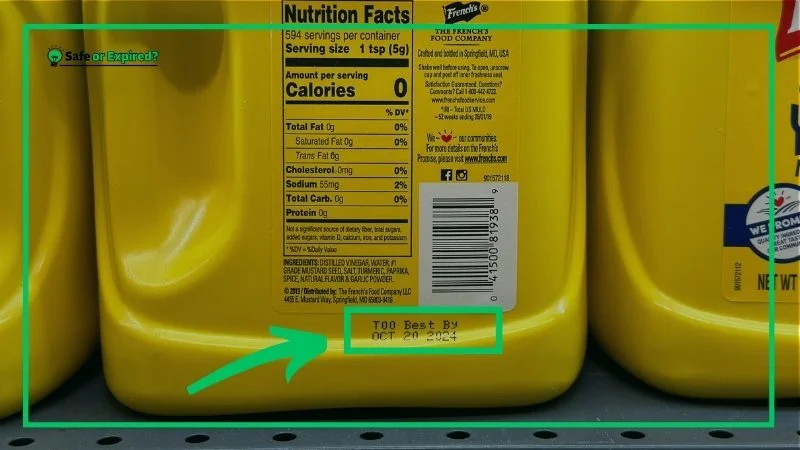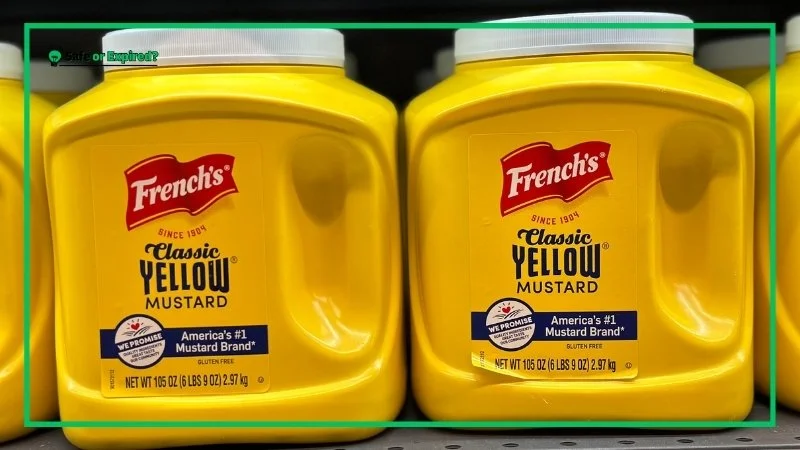“Can you eat expired mustard?” is the first thing that comes to mind when we see a jar of mustard that’s been sitting at the back of the pantry for who knows how long. The answer is that expired mustard is generally safe, but you should consider many things before you eat it. Read the full article to understand the difference between best-by dates of Mustard Seeds, Mustard Powder and Mustard Oil.
Can You Eat Expired Mustard Or Is IT Bad IDeA?
Yes, eating expired mustard is generally safe. The mustard contains acidic ingredients, which makes it naturally resistant to bacterial growth. This means it can last beyond the printed date without posing health risks. However, its flavor and potency might lessen over time.
To learnz more about mustard ingredients, you can check its packaging:

That’s why always inspect for odd smells, color changes, or mold before using it. Now, many people also have questions about mustard seeds, powder, and oil. Let’s now discuss all of them.
Can You Eat Expired Mustard Seeds?
Yes, you can eat expired mustard seeds, as long as they don’t show any signs of spoilage such as mold. Mustard seeds are quite durable due to their lack of moisture. Therefore, they can easily last for years past their best-by date.
Over time, they may lose some of their potency and flavor, but they remain safe to consume.
Can You Use Expired Mustard Powder?
Expired mustard powder is generally safe if stored correctly — in a dry, cool environment and in a sealed container. Like mustard seeds, the powder may lose its pungency over time, but it doesn’t typically become unsafe to consume.
Before using expired mustard powder, check for any unusual odors, discoloration, or signs of moisture. It should be safe to use if it appears dry and smells normal.
Can We Use Expired Mustard Oil?
Expired mustard oil can still be used but with caution. Mustard oil’s quality and safety after the best-by date is largely depend on its storage conditions. If stored in a cool, dark place and the oil smells and looks fine (it should have a clear appearance without any cloudiness or sediment and a characteristic sharp, pungent aroma), it’s likely safe to use.
However, any rancidity or off-odors indicate that the oil has oxidized and should not be consumed. Rancid oil can contain harmful compounds that may pose health risks, so it’s important to discard any mustard oil that has gone bad.
Can Expired Mustard Make You Sick? Find out here
In most cases, eating expired mustard doesn’t make you sick. The reason is that the mustard is made with ingredients that are not just tasty but also natural preservatives. The vinegar and spices act as barriers to bacteria, which is why mustard can last so long, even after its best-by date.
However, while it’s safe, there are a few changes you might notice:
- Flavor Changes: Over time, expired mustard may lose its zing. The potent, spicy flavor that mustard is known for might mellow out. So, if you’re adding it to your sandwich or dressing, you might need to use more than usual to achieve the same taste profile.
- Texture Alterations: Another possible change is in its texture. Mustard sat for a long while might separate, leading to a more watery consistency on top. This doesn’t mean it’s spoiled. A quick stir can usually bring it back to its original state.
- Color Shifts: Mustard may also darken as it ages. This is purely aesthetic and doesn’t affect its safety or general usability in cooking.
So, what’s the bottom line? Eating expired mustard usually just means you’re getting a less potent condiment. It’s unlikely to harm you unless it shows signs of spoilage, such as mold, or a significant change in texture that stirring can’t fix.
However, it’s always best to trust your senses. If something seems off, it’s better to be safe and throw it out. In the grand scheme of things, mustard is relatively inexpensive, and replacing it might be worth the peace of mind.
When Does Mustard Expire? (Commercial vs Homemade)
Mustard’s expiry varies based on its type and storage. Unopened, commercially produced mustard lasts 1-2 years, retaining quality for up to a year once opened and refrigerated. Homemade mustard, kept refrigerated, generally lasts 1-2 months.
People often ask, “Does refrigerated mustard go bad?” Yes, it can, especially if not stored correctly. Signs that your refrigerated mustard has gone bad include an unpleasant smell, discoloration, or the presence of mold.
Now, the question is, “Does mustard expire if not opened?” Yes, eventually, all good things must come to an end, including mustard’s potency. However, it tends to exceed its date without becoming harmful.
Once you twist that cap open, the clock starts ticking a bit faster. Opened mustard can last about 6-12 months if stored properly in the refrigerator. The cold environment helps maintain its quality.
Here’s a general table about mustard’s expiry:
| Storage Condition | Opened Mustard | Unopened Mustard |
| Counter | Not Recommended | Up to 2 years |
| Fridge | Up to 1 year | 2-3 years |
What Are the Signs of Expired Mustard? What to Look For?
Expired mustard may exhibit signs like unpleasant odors, changes in texture (becoming either too thick or watery), discoloration, or the presence of mold. Its flavor can also degrade, losing its characteristic tanginess. If you notice any of these things, it’s best to discard the mustard to ensure safety.
Unpleasant Odor
When mustard goes bad, one of the first signs you might notice is an off-putting smell. Fresh mustard has a tangy, spicy aroma. If your mustard smells sour or just not right, it clearly indicates that it’s time to throw it out.
Damaged Packaging
If the mustard container is leaking, swollen, or rusted, it could indicate that the mustard has been exposed to air or bacteria, leading to spoilage. It must look like this:

Change in Texture
Mustard that has expired or is on the verge of spoiling may show significant changes in texture. It could become either excessively thick and difficult to spread or watery, with the ingredients separating. While some separation is normal (and can be fixed by stirring), a continuous change in texture is not.
Discoloration
Fresh mustard typically has a vibrant yellow to deep brown color, depending on the type. If you notice that the mustard has significantly dulled in color or has developed dark or light spots, it might have gone bad. Discoloration is a telltale sign of degradation.
Mold Growth
The most obvious sign that mustard has expired is the presence of mold. Any signs of mold, which could appear as fuzzy spots of various colors, mean the mustard should be discarded immediately. Mold can pose health risks, so it’s best not to take any chances.
Altered Taste
If the mustard passes the visual and smell tests, you might decide to do a taste test. Mustard that has gone bad may lose its characteristic tangy and spicy flavor profile, becoming bland or even unpleasantly sour. If the taste is off, it’s best not to consume it.
Best-By or Expiry Date
While not a direct sign of spoilage, the best-by date can still serve as a useful guideline. If your mustard is significantly past its “best by” date, it might be wise to consider replacing it, especially if accompanied by any of the abovementioned signs.

How Long Is Mustard Good For After It’s BesT-By Date? The deadline
Mustard is known for its long shelf life, and it can often be good for use well beyond its best-by date, which is typically around a year. However, it depends on factors like opened vs. unopened and storage conditions when it comes to commercial mustard.
Usually, commercially produced mustard can remain safe and retain its quality.
Unopened mustard: Up to 2-3 years past it’s best-by date when stored in a cool, dry place. The high acidity and preservatives found in mustard help keep it stable and safe for consumption even after expiry.

- Opened mustard: Around one year in the refrigerator after the “best by” date. Once opened, mustard’s exposure to air and potential contaminants can shorten its lifespan compared to when it’s unopened. However, it still remains usable for a considerable amount of time if kept refrigerated.
It’s essential to note that while mustard can last beyond its best-by date, its quality might diminish over time.
A little off-topic. Ever looked at those McDonald’s sauce packets and thought, ‘Do these ever go bad?’ It’s something many of us think about. If you’re curious, we’ve got a whole guide just for that. Take a peek at “Do McDonald’s Sauces Expire or Not? (The Ultimate Guide)” to get the lowdown on those sauces.
And then there’s mayo. Especially the Hellmann’s kind we all love. Does it stay fresh past the date on the jar? For anyone wondering about their mayo, we’ve answered all your questions right here: “How Long Is Hellmann’s Mayo Good For After Expiration Date?”.
FAQ
Can You Get Food Poisoning From Expired Mustard?
It’s highly unlikely to get food poisoning from expired mustard due to its acidic nature, which creates an environment that’s generally unfriendly to bacteria growth. However, if the mustard shows signs of spoilage like mold, it’s better to avoid consuming it.
Can I Use Expired Mustard Oil for My Hair?
Using expired mustard oil for hair might not pose the same risks as consuming it. If the oil smells rancid or has changed in texture, it’s best not to use it, as it could irritate the skin or scalp.
Can You Eat Expired Dijon Mustard?
Yes, you can eat expired Dijon mustard if it has been stored properly and doesn’t show any unusual signs, such as an off smell, change in texture, or mold. Like other types of mustard, Dijon mustard can last well beyond its expiration date, especially when kept refrigerated after opening.
Conclusion
Understanding the shelf life of mustard and its derivatives can seem tricky, but armed with the right information, you can make safe choices for your culinary adventures. Here’s a quick recap:
- Can You Eat? Expired mustard is safe, but it is better if you consume good-quality ones.
- Mustard Seeds and Powder: These can last long if stored properly, even past their best-by date, but always check for signs of spoilage.
- Mustard Oil: While expired mustard oil should be used cautiously, it may still be viable for non-consumable uses, like hair treatment.
- Food Safety: Always prioritize food safety. If there’s any doubt about the quality or safety of your mustard products, it’s better to err on the side of caution and dispose of them.
That’s all. Remember these points to ensure that your meals are not only delicious but safe as well.

